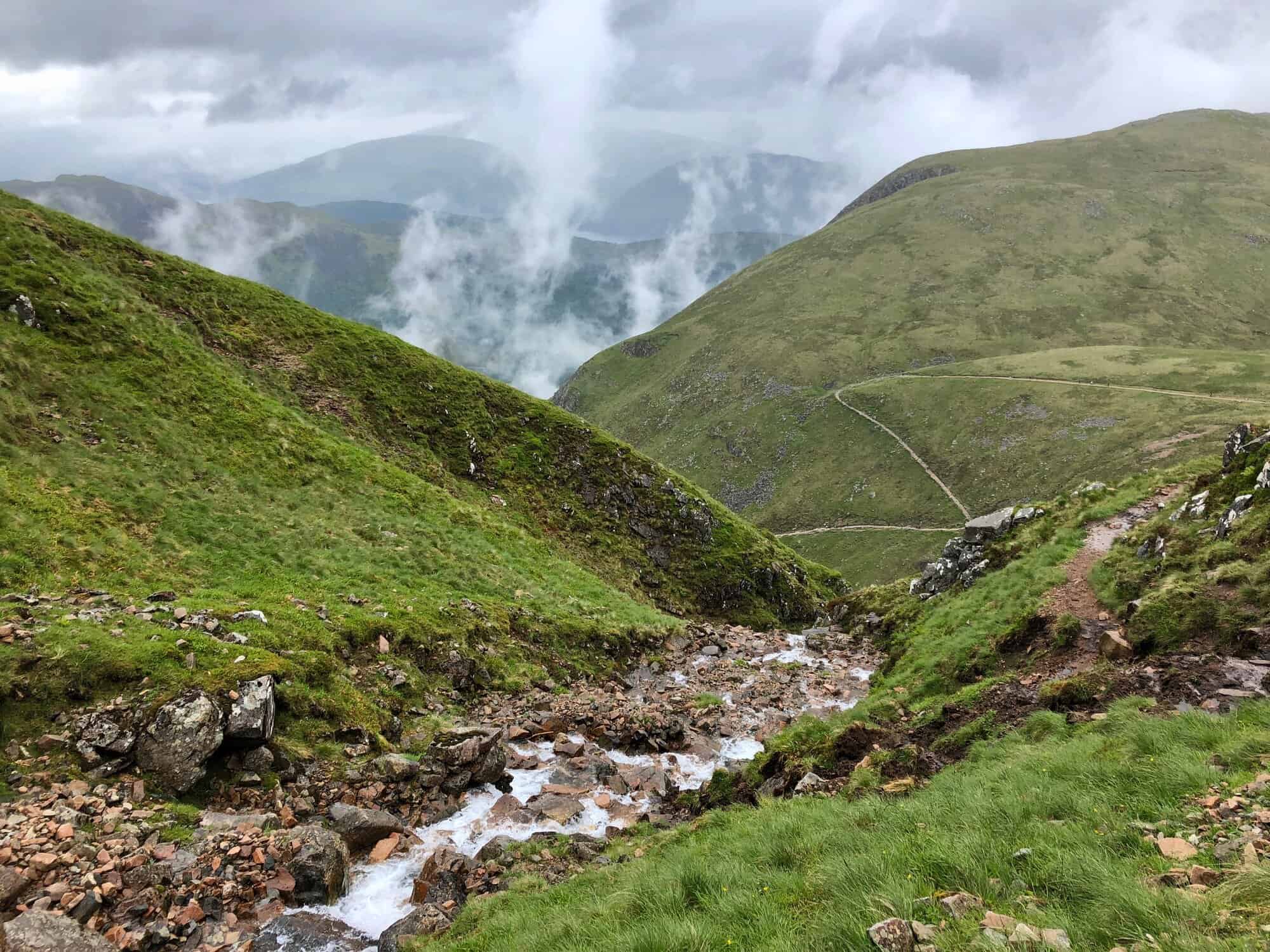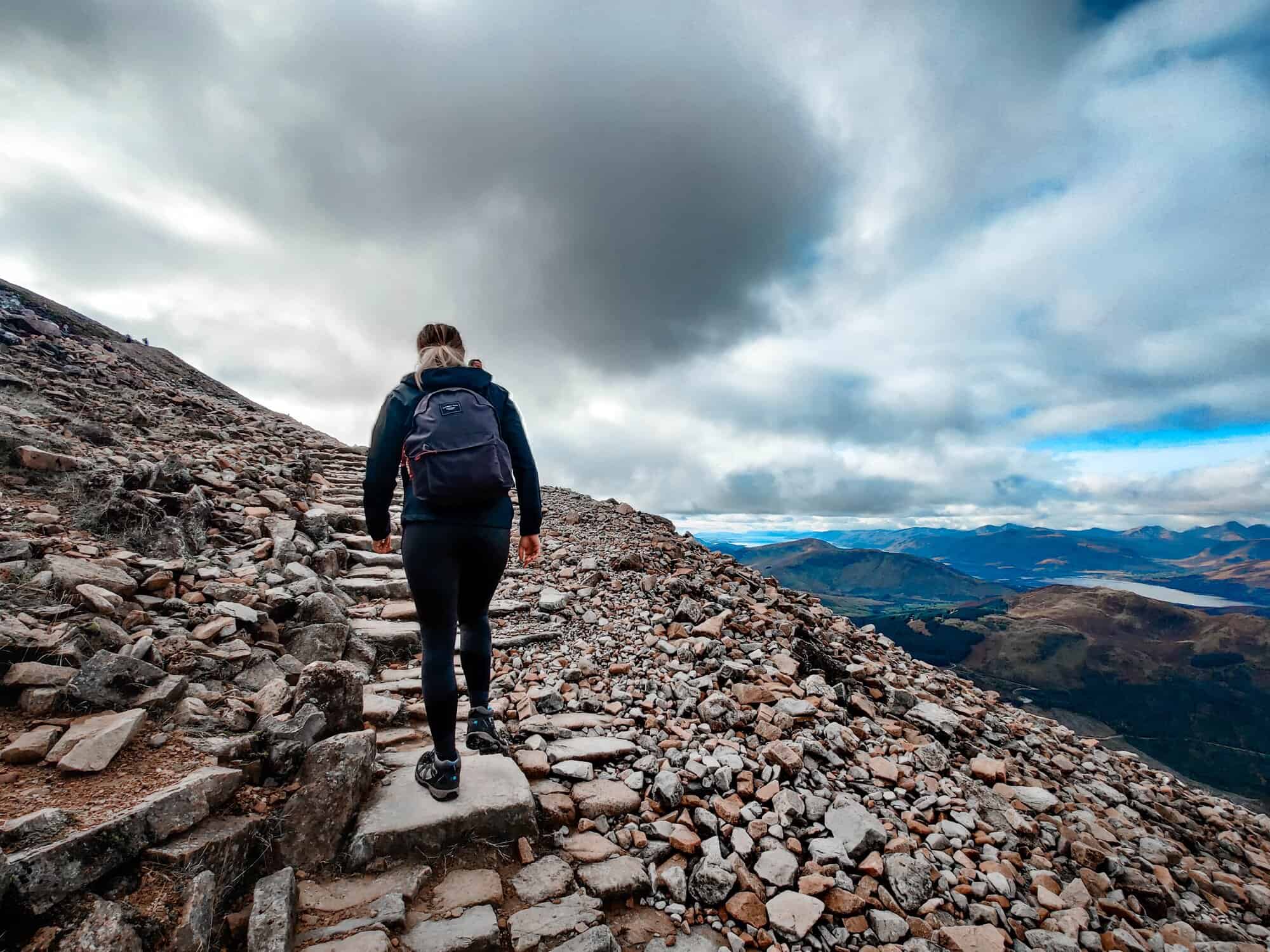The National Three Peaks Challenge involves climbing the three highest peaks of Scotland, England and Wales, often within 24 hours. We will be completing in a more leisurely though still arduous 3 days
The total walking distance is 23 miles (37km) and the total ascent is 3064 metres (10,052ft) – twice the ascent of the Yorkshire Three Peaks, over a similar total walking distance. The total driving distance is 462 miles.
The three mountains are:
- Snowdon, in Wales (1085m)
- Scafell Pike, in England (978m)
- Ben Nevis, in Scotland (1345m)
A popular misconception is that the three mountains that form the challenge are the three tallest on the British mainland. Rather, they are the tallest mountains within each representative country: Scafell Pike is the tallest in England; Snowdon, the tallest in Wales and Ben Nevis the tallest in Scotland. Over one hundred peaks in Scotland are higher than Scafell Pike, and 56 higher than Snowdon.
Raising Funds and Awareness for the charity Personalised Eating Disorder Support (PEDS)
We are completing the 3 peaks challenge to support PEDS, a Nurse-led specialist eating disorder charity based in Peterborough, supporting individuals in the Peterborough and Cambridgeshire area.
The charity offers assessment and support with signposting and where appropriate to service users, families and loved ones and professionals. The service offers users individual sessions which are tailored to meet the unique needs of each person. They also provide family sessions which include practical help, education and support. They operate mostly remotely and sessions are via Microsoft Teams or Zoom. This includes assessments, 1:1s and groups (service users and carers). Face-to-face sessions, if required, are held at Boroughbury Medical Centre.
Education, advice and training packages can also be provided to GPs, schools and other organisations for a small fee.
PEDS became an independent eating disorder charity in April 2014 (Registered Number 1156578). Prior to this, since 2013 we provided services as an affiliate of the established eating disorders charity, Caraline.
Getting Fit For The July Challenge
Andrew Goode will be completing the challenge and will getting mountain ready by training with Liam and the team at The Workout Hub.
Climbing Ben Nevis, the highest mountain in the British Isles, requires a good level of fitness and preparation. The climb is challenging and can take 7-9 hours to complete, depending on the route and your fitness level. Here are some fitness training recommendations that I will need to complete to prepare for climbing Ben Nevis:
- Cardiovascular training: Climbing Ben Nevis requires a lot of endurance and cardiovascular fitness. You should aim to do at least 30 minutes of aerobic exercise, such as running, cycling, or brisk walking, three to four times a week. Gradually increase the duration and intensity of your workouts to build up your endurance.
- Strength training: You’ll need strong legs, core, and upper body to tackle the steep inclines and uneven terrain of Ben Nevis. Incorporate exercises like lunges, squats, step-ups, and planks into your fitness routine to build up your strength.
- Hill walking: Nothing beats getting out into the great outdoors and practicing your hiking skills. If possible, incorporate regular hill walking into your training plan, gradually increasing the difficulty of the terrain and length of your walks. This will help you build up the necessary endurance and confidence for the Ben Nevis climb.
- Practice with a weighted backpack: You’ll need to carry water, food, and other essentials with you during the climb, so get used to the weight by practicing with a weighted backpack during your training walks.
Some of the challenges an individual faces when completing the national 3 peaks challenge
Completing the National Three Peaks Challenge is no small feat and comes with its fair share of challenges for individuals seeking to conquer this demanding adventure. The challenge involves summiting the highest peaks in Scotland, England, and Wales – Ben Nevis, Scafell Pike, and Snowdon – within a 24- or 48-hour timeframe. As participants undertake this endurance test, several obstacles and difficulties emerge.
Physically, the challenge poses a significant hurdle. Each of the three peaks presents its own distinct terrain and elevation gain. Ben Nevis in Scotland is the tallest of the bunch, reaching 1,345 meters (4,413 feet). The relentless ascent on uneven trails can be taxing on an individual’s muscles and joints, especially for those not accustomed to long hikes or extreme altitudes. Scafell Pike in England and Snowdon in Wales also demand substantial stamina, as hikers navigate rugged paths, steep inclines, and potentially unpredictable weather conditions.
The time constraint adds another layer of complexity. While the 24-hour option is more intensive, even the extended 48-hour challenge requires meticulous planning and execution. Managing time effectively becomes crucial, as participants need to minimise rest breaks and transitions between peaks to stay within the designated timeframe. The pressure to stay on schedule can lead to fatigue and mental strain, potentially impacting decision-making and overall morale.
Weather is an unpredictable adversary that can escalate the challenges further. The peaks are known for their ever-changing weather patterns, which can range from clear skies to heavy rain, fog, and even snow at higher elevations. Sudden shifts in weather can affect visibility, navigation, and overall comfort. Dealing with adverse weather conditions requires both physical resilience and mental fortitude.
Navigational skills are also tested, especially during night-time ascents or in poor visibility conditions. Accurate navigation becomes essential to avoid getting lost or straying off the designated paths. Navigating during the dark can be disorienting and demanding, requiring participants to rely on their map-reading skills, compass, and possibly GPS devices.
Lastly, the National Three Peaks Challenge is often completed as a team effort. While this can provide emotional support and camaraderie, it also presents interpersonal challenges. Coordinating logistics, dealing with varying fitness levels within the group, and managing disagreements can add an extra layer of complexity to the experience.
In summary, the National Three Peaks Challenge is not just a physical endeavour, but also a mental and logistical test. The physical demands, time constraints, variable weather conditions, navigational requirements, and group dynamics all contribute to the array of challenges an individual faces when undertaking this impressive feat. Overcoming these challenges requires thorough preparation, mental resilience, and a determination to push through the obstacles encountered along the way.





